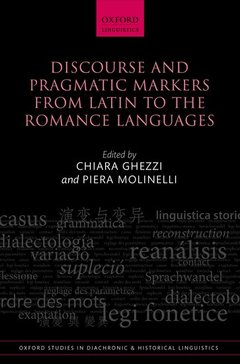Description
Discourse and Pragmatic Markers from Latin to the Romance Languages
Oxford Studies in Diachronic and Historical Linguistics Series, Vol. 9
Coordinators: Ghezzi Chiara, Molinelli Piera
Language: English
Subject for Discourse and Pragmatic Markers from Latin to the...:
Publication date: 07-2014
Support: Print on demand
Support: Print on demand
Description
/li>Biography
/li>
This book examines the historical development of discourse and pragmatic markers across the Romance languages. These markers serve to indicate the organization of the discourse, the speaker's relationship with the interlocutor, and the speaker's stance with regard to the information expressed. Their relevance is in assisting interpretation, despite the fact that they have little or no propositional content. In this book, distinguished scholars from different theoretical backgrounds analyse the different classes of discourse and pragmatic markers found in Latin and the Romance languages and explore both their diachronic development and their synchronic properties. Following an introduction and overview of the development of these markers, the book is divided into two parts: the first part investigates pragmatic markers developed from verbs, such as Latin quaeso, Romanian ma rog, and Spanish o sea; the second looks at adverbs as discourse markers, such as French déjà and Italian già, Romanian atunci and Portuguese aliás. Chapters address a variety of theoretical issues such as the cyclic nature of functional developments, the nature of grammaticalization and pragmaticalization, semantic change, and the emergence of new pragmatic values. The arguments presented also have consequences for any analysis of the interfaces between grammar, discourse, and interaction.
Chiara Ghezzi is a researcher at the University of Bergamo, where she was previously Adjunct Lecturer in Sociolinguistics and Didactics of the Italian Language. She received her PhD from the University of Pavia with a dissertation entitled 'Vagueness Markers in Contemporary Italian: Intergenerational Variation and Pragmatic Change'. Her research interests include historical pragmatics, the history of old Italian, grammaticalization theory, sociolinguistic variation in contemporary Italian, and discourse and pragmatic markers. Her publications include three articles in Linguistica e Filologia. Piera Molinelli is Professor of General Linguistics at the University of Bergamo. She coordinates several Italian national research groups and has organized national and international conferences. Her areas of research include diachronic and historical linguistics, the history of Latin and old Italian, discourse and pragmatic markers, grammaticalization, language contact, and multilingualism. She is the author of Fenomeni della negazione dal latino all'italiano (La Nuova Italia 1988), along with a number of journal articles, and is co-editor of Ars linguistica (Bulzoni 1998), Comunicare nella torre di Babele. Repertori plurilingui in Italia oggi (Carocci 2001), Synchrony and Diachrony: A dynamic interface (Benjamins 2013), and Plurilinguismo e diglossia nella Tarda Antichità e nel Medioevo (SISMEL Il Galluzzo 2013).
© 2024 LAVOISIER S.A.S.
These books may interest you

The Rise of Discourse Markers 109.06 €



